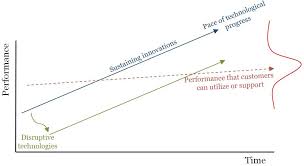The Impact of Disruptive Technology on Industries
Disruptive technology has become a driving force in reshaping industries across the globe. From artificial intelligence to blockchain, these innovations have the power to revolutionise traditional business models and create new opportunities for growth and efficiency.
What is Disruptive Technology?
Disruptive technology refers to innovations that fundamentally alter the way industries operate, often displacing established market leaders and changing consumer behaviour. These technologies challenge the status quo and introduce novel approaches that can redefine entire sectors.
Examples of Disruptive Technologies
One prominent example of disruptive technology is the rise of ride-sharing services like Uber and Lyft, which have transformed the transportation industry by offering convenient alternatives to traditional taxis. Another example is e-commerce giant Amazon, whose online platform disrupted brick-and-mortar retail businesses.
The Benefits of Disruptive Technology
While disruptive technology can pose challenges for existing businesses, it also brings numerous benefits. These innovations drive competition, spur innovation, improve efficiency, and enhance customer experiences. Companies that embrace disruptive technology can gain a competitive edge and thrive in rapidly evolving markets.
The Future of Disruptive Technology
As technology continues to advance at a rapid pace, we can expect to see even more disruptive innovations emerge in various industries. It is essential for businesses to stay agile, adapt to change, and leverage these technologies to stay ahead of the curve.
In conclusion, disruptive technology is reshaping industries and creating new opportunities for growth and innovation. By embracing these changes and harnessing the power of disruptive technologies, businesses can thrive in an increasingly dynamic and competitive landscape.
Understanding Disruptive Technology: Key Questions and Insights for Modern Industries
- What is disruptive technology?
- How does disruptive technology impact industries?
- What are some examples of disruptive technologies?
- How can businesses adapt to disruptive technology?
- What are the benefits of embracing disruptive technology?
- What challenges do companies face when dealing with disruptive technology?
- Is it necessary for all industries to adopt disruptive technology?
- What trends are shaping the future of disruptive technology?
What is disruptive technology?
Disruptive technology refers to innovations that fundamentally alter the way industries operate, often displacing established market leaders and changing consumer behaviour. These groundbreaking technologies challenge traditional norms and introduce new approaches that have the potential to redefine entire sectors. Disruptive technology is characterised by its ability to create significant shifts in the market landscape, driving innovation, competition, and ultimately transforming the way businesses and consumers interact within various industries.
How does disruptive technology impact industries?
Disruptive technology has a profound impact on industries by challenging existing norms, transforming business models, and reshaping competitive landscapes. These innovations often introduce novel approaches that can revolutionise traditional sectors, leading to the displacement of established market leaders and the creation of new opportunities for growth and efficiency. By driving competition, fostering innovation, and enhancing customer experiences, disruptive technology forces businesses to adapt or risk becoming obsolete. Companies that embrace these changes and leverage disruptive technologies can gain a competitive edge and thrive in an ever-evolving market environment.
What are some examples of disruptive technologies?
Numerous examples of disruptive technologies have reshaped industries and transformed the way we live and work. From ride-sharing services like Uber to streaming platforms such as Netflix, these innovations have challenged traditional business models and revolutionised consumer behaviour. Other notable examples include artificial intelligence, blockchain technology, and 3D printing, each offering unique opportunities for businesses to innovate and adapt to a rapidly changing landscape. These disruptive technologies continue to drive competition, spur innovation, and create new possibilities across various sectors, highlighting the profound impact they have on shaping the future of industries worldwide.
How can businesses adapt to disruptive technology?
Businesses can adapt to disruptive technology by embracing a culture of innovation and agility. It is crucial for organisations to stay informed about emerging technologies and trends, continuously assess their impact on the industry, and be willing to experiment with new ideas. By fostering a mindset that values adaptation and change, businesses can proactively identify opportunities presented by disruptive technology and pivot their strategies accordingly. Additionally, investing in employee training and development to build digital skills and capabilities can empower teams to navigate the evolving technological landscape effectively. Ultimately, businesses that are open to change, flexible in their approach, and quick to respond to market shifts are better positioned to thrive in the era of disruptive technology.
What are the benefits of embracing disruptive technology?
Embracing disruptive technology offers a myriad of benefits for businesses and industries. By adopting innovative technologies that challenge traditional norms, organisations can gain a competitive edge, drive efficiency, and foster innovation. Disruptive technology opens up new opportunities for growth and expansion, enabling companies to reach new markets and cater to evolving consumer demands. Additionally, embracing disruptive technology can lead to cost savings, improved processes, and enhanced customer experiences. Overall, integrating disruptive technologies into business strategies can position companies at the forefront of their industries and pave the way for long-term success in an ever-changing landscape.
What challenges do companies face when dealing with disruptive technology?
When companies encounter disruptive technology, they often face a myriad of challenges that require strategic navigation and adaptation. One key challenge is the need to rapidly adjust existing business models to align with the innovative changes introduced by disruptive technologies. This may involve rethinking operational processes, restructuring internal systems, and retraining employees to embrace new ways of working. Additionally, companies must contend with heightened competition from agile startups that leverage disruptive technology to disrupt traditional markets. Balancing the risks and opportunities presented by disruptive technology while maintaining profitability and relevance in a constantly evolving landscape poses a significant challenge for companies striving to remain competitive and future-proof their businesses.
Is it necessary for all industries to adopt disruptive technology?
In the context of disruptive technology, the question of whether all industries must adopt these innovations is a complex and nuanced one. While embracing disruptive technology can bring significant benefits such as increased efficiency, improved competitiveness, and enhanced customer experiences, not all industries may find it necessary or feasible to adopt these technologies. The decision to adopt disruptive technology should be based on a careful assessment of industry-specific factors, organisational capabilities, and strategic goals. Industries that choose to adopt disruptive technology must be prepared to navigate challenges such as implementation costs, workforce training, and potential disruption to existing processes. Ultimately, the adoption of disruptive technology should align with the long-term vision and objectives of each industry to maximise its potential impact and value.
What trends are shaping the future of disruptive technology?
The future of disruptive technology is being shaped by several key trends that are driving innovation and transformation across industries. From the rapid advancement of artificial intelligence and machine learning to the widespread adoption of blockchain technology, these trends are revolutionising traditional business models and creating new opportunities for growth. Additionally, the Internet of Things (IoT) is connecting devices and systems in ways that were previously unimaginable, leading to increased efficiency and productivity. As businesses continue to embrace these trends and leverage disruptive technologies, we can expect to see further disruption and evolution in the way we live, work, and interact with technology.




